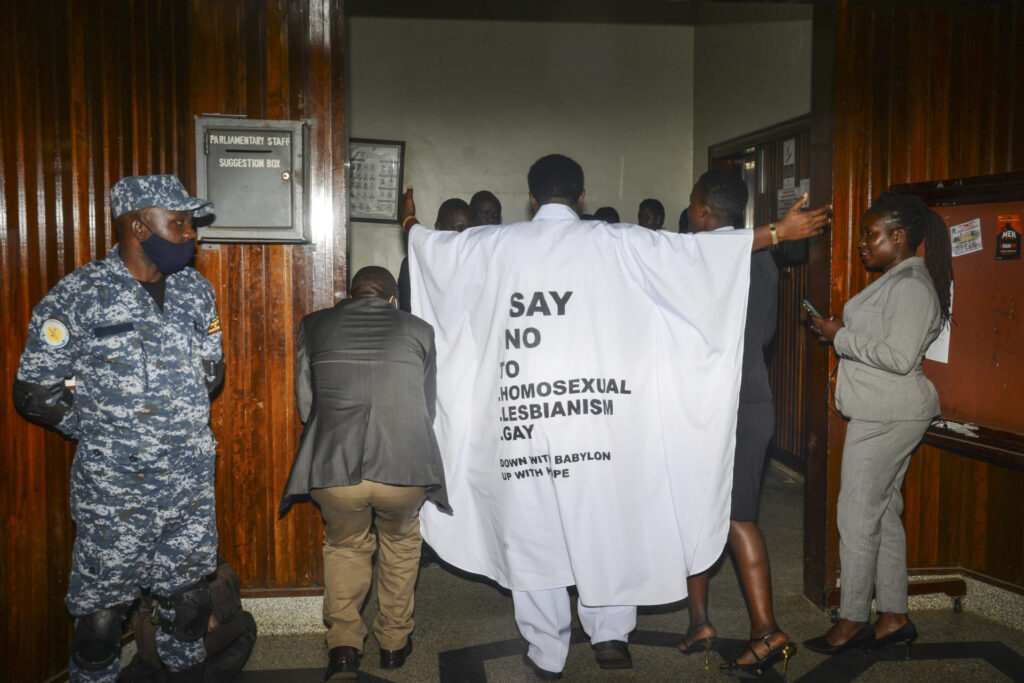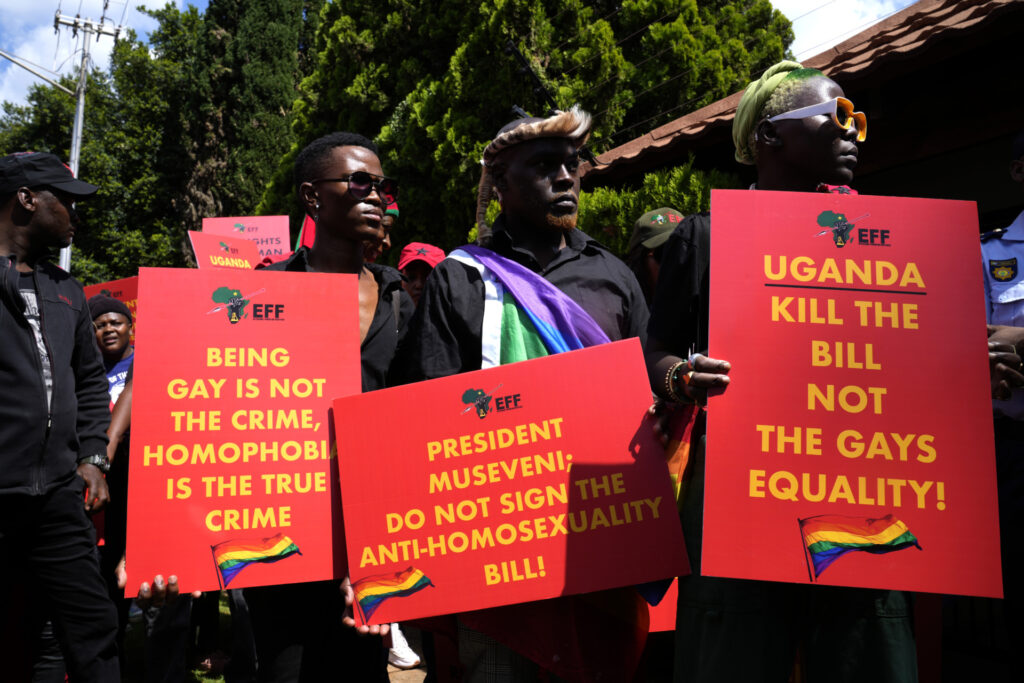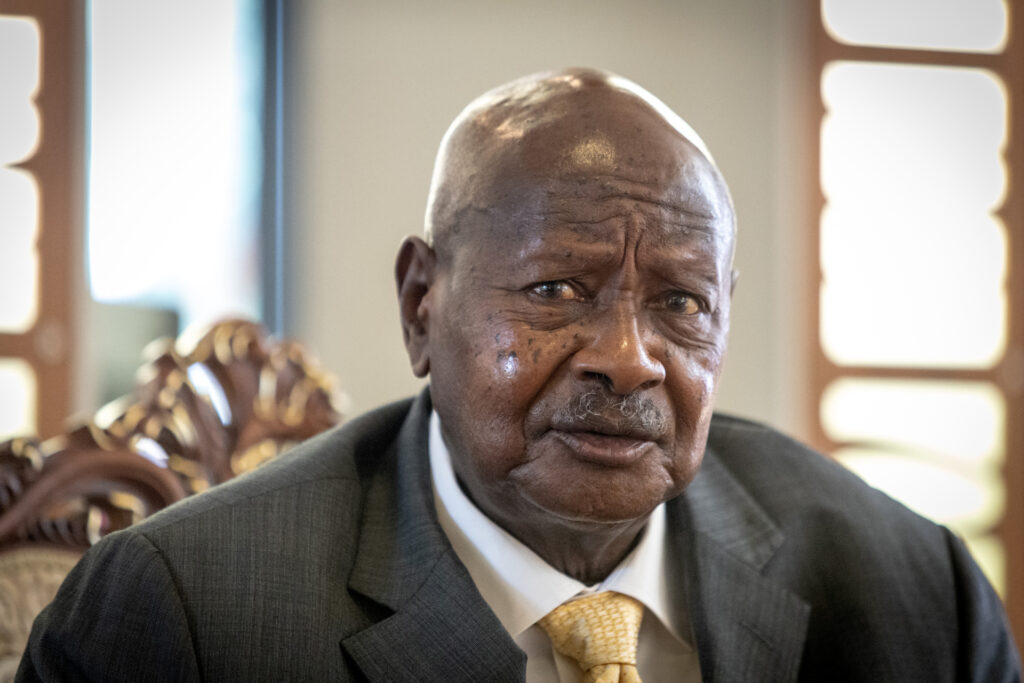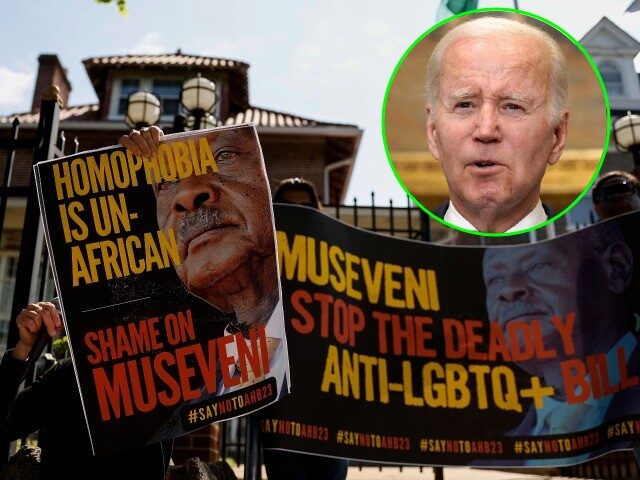The White House published a statement on Monday by far-left President Joe Biden, threatening to cut life-saving aid to Uganda through programs such as the U.S. President’s Emergency Plan for AIDS Relief (PEPFAR) in response to the country passing its “Anti-Homosexuality Act.”
Dictator Yoweri Museveni signed the “Anti-Homosexuality Act” into law on Monday. The law brutally punishes those found guilty of “engaging in acts of homosexuality,” in some cases with life imprisonment or the death penalty. Individuals charged with “knowingly promot[ing] homosexuality,” despite their own sexual orientation, could be imprisoned for 20 years. Organizations, potentially including Western NGOs or government programs, could be banned from the country for a decade on the same charge.
The law also lumps in overt sexual crimes, such as statutory rape, with identifying as LGBT. The law uses the term “aggravated homosexuality” to mean an adult engaging in same-sex sexual relations with a minor, individuals infected with HIV engaging in sexual activity, or same-sex relations with “vulnerable” people, presumably individuals who cannot consent due to mental health issues. “Aggravated homosexuality” carries the death penalty.
The “Anti-Homosexuality Act” also punishes individuals believed to know of sexual assaults of children and the “vulnerable” but do not alert the police.

Ugandan MP John Musila wears clothes with an anti-LGBTQ message as he enters the Parliament to vote on a harsh new anti-gay bill, on March 21, 2023. (AP Photo/Ronald Kabuubi, File)
“The enactment of Uganda’s Anti-Homosexuality Act is a tragic violation of universal human rights—one that is not worthy of the Ugandan people, and one that jeopardizes the prospects of critical economic growth for the entire country,” President Biden said in a statement published on Monday. “I join with people around the world—including many in Uganda—in calling for its immediate repeal.”
If Uganda does not repeal the law, Biden warned, it could lose significant percentages of the $1 billion a year that American taxpayers send in aid to the country:
I have directed my National Security Council to evaluate the implications of this law on all aspects of U.S. engagement with Uganda, including our ability to safely deliver services under the U.S. President’s Emergency Plan for AIDS Relief (PEPFAR) and other forms of assistance and investments. My Administration will also incorporate the impacts of the law into our review of Uganda’s eligibility for the African Growth and Opportunity Act (AGOA).
Biden also stated that Washington was considering sanctioning Uganda and banning lawmakers responsible for the law from the country.
“Our programs have boosted economic growth and agricultural productivity, increased investments in Ugandan businesses, and strengthened our trade cooperation,” Biden observed. “In total, the U.S. Government invests nearly $1 billion annually in Uganda’s people, business, institutions, and military to advance our common agenda.”
While Biden’s written statement was unequivocal, when asked about Uganda in public on Monday, Biden offered little clarity:
Q Does the U.S. have any (inaudible) to Uganda?
THE PRESIDENT: I’m sorry, I’m having trouble hearing you.
Q On Uganda, sir — any message to the people of Uganda?
THE PRESIDENT: Not right now, no. I think I heard the question.
Don’t get your feet dirty, man.
All right?
American Secretary of State Antony Blinken issued a separate statement on the law, describing himself as “deeply troubled” by the legislation and announcing his agency would develop “mechanisms to support the rights of LGBTQI+ individuals in Uganda.”
Ugandan Speaker to Parliament Anita Among lost her U.S. visa on Monday, suspected to be the first individual targeted by sanctions in response to the “Anti-Homosexuality Bill.”
Asuman Basaalirwa, a Ugandan lawmaker who led the process of turning the bill into law, announced Among’s loss of an American visa and declared her the “first victim” of America’s response to the legislation.
“You will cancel our visas and by the way it is your right,” Basaalirwa said. “For me I have no problem with the way a country manages their affairs.”
The lawmaker urged Washington to move to cancel the visas of all of Uganda’s parliament, with the exception of the two MPs who voted against the bill and Museveni. He also urged Ugandans to take money out of international banks if they are anti-gay to avoid the consequences of international sanctions — and urged Museveni to cut spending because “our colleagues in the western world have indicated and actualised their threats” to sanction the country.
In response to Biden’s call to reevaluate the viability of programs such as PEPFAR in Uganda, doctors in the country warned that losing those funds could have a devastating impact on the HIV-positive community in the country.
Stephen Watiti, the head of the National Forum of People Living with HIV/Aids Networks in Uganda (NAFOPHANU), told the Ugandan Monitor:
If they stopped funding for even a week, you would see trouble. You would lose somebody you know, it might not be overnight, because over 90 percent of drugs we have in the country are from these people; [donors like PEPFAR]. The US government is not gay but they have lobbyists who can make a lot of noise and make life hard for you [Ugandans with HIV/AIDS].
Watiti also insisted the Anti-Homosexuality Law would not block any HIV-positive people from receiving care.
“There is nobody who is going to stop anyone from getting care. You may not even tell that someone who has come to the hospital is from the LGBTQ+ group,” the doctor claimed.
“Americans are trying to frame it as if we are against certain groups. I don’t know why they are attaching the Anti-homosexuality Act to the Ministry of Health. It has nothing to do with health,” Museveni official Daniel Kyabayinze, the head of public health affairs at the Health Ministry, told the newspaper.
Following the parliament’s first passage of the bill in March, however, gay rights activists on the ground said LGBT individuals were already avoiding health centers and fearing for their jobs, apartments, and even lives.
“LGBTQ persons are going to fear going to health centers for services. … There’s going to be a lot of trauma and cases of mental health that will lead to a lot of suicide,” Ugandan gay rights activist Frank Mugisha told Reuters in March.
The activists warned that landlords would not rent to individuals who could be perceived as LGBT, doctors may not treat them, and other service providers would similarly shun them from society out of fear of being accused of “promoting homosexuality” by existing in the same spheres as those individuals.

Activists hold placards during their picket against Uganda’s anti-homosexuality bill at the Ugandan High Commission in Pretoria, South Africa on April 4, 2023. (AP Photo/Themba Hadebe, File)
Uganda’s parliament first passed the bill in March, but Museveni refused to sign it on the grounds that it did not allow for suspected LGBT people to “reform.”
“This country has issued amnesty for people who have carried out criminal activities of treasonous nature against this country,” Museveni explained. “A similar provision would be provided in this law to ensure that a person who comes out on his own is not criminalized.”
“I totally agree with the bill,” he continued in March, “but my original problem is the psychologically disoriented person. What you are saying is that the law doesn’t recognise him as long as he does not act. But how do you provide for him to come out?”

An interview with Yoweri Museveni in Pretoria, South Africa, on Wednesday, March 1, 2023. Photographer: Guillem Sartorio/Bloomberg via Getty Images
The bill Museveni signed explicitly states that individuals who publicly identify as “homosexuals” will not face criminal charges unless they are suspected of engaging in any same-sex romantic relationships.
Uganda’s Observer newspaper explained on Monday:
The new Act doesn’t criminalise anyone who identifies as homosexual, but mandates life in prison for anyone who engages in homosexual acts, up to 20 years for promoting homosexuality, and a three-year sentence for children convicted of homosexuality while certain acts of gay sex could warrant the death penalty.
Eleven individuals and groups, including the two lawmakers who voted against the law, filed a petition before Uganda’s Constitutional Court on Tuesday, asserting that the law did not abide by constitutional or general legal standards. The Monitor reported that their petition condemned the law as “institutionali[zing] a culture of hatred” and also argued that the parliamentary process that resulted in the passage of the bill was unlawful because “the conduct of the Speaker of the 11th Parliament (Anita Among) during debate and passing of the Bill amounted to bias and is inconsistent with and in contravention of Articles 20, 89 (1) and (2) of the Constitution.”

COMMENTS
Please let us know if you're having issues with commenting.